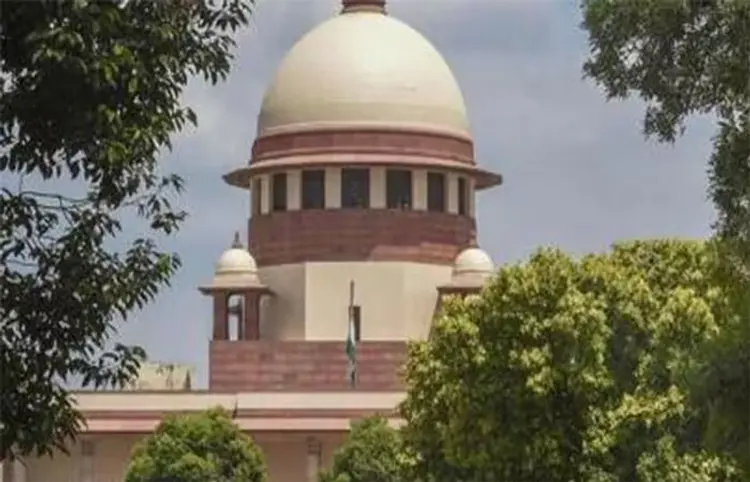New Delhi: President Draupadi Murmu has asked the Supreme Court under Article 143 (1) of the Constitution whether the Supreme Court can set a time limit of three months to decide the Bills reserved by the governors under Article 201? However, there is no such provision in the Constitution. The next day after Justice Bhushan Ramakrishna Gavai was sworn in as the Chief Justice of the Supreme Court, the President has raised a big question before the Supreme Court. In the Tamil Nadu vs. Governor case, the Supreme Court ruled on 8 April that neither the Governor nor the President can stop any bill indefinitely.
President Draupadi Murmu has asked 14 questions to the Supreme Court in terms of five pages using the powers provided under Article 143 (1) of the Constitution. Along with this, the President has sought opinion from the Supreme Court about the powers of the Governor and the President under Article 200 and Article 211 regarding the Bills passed by the Assembly and Parliament. The Supreme Court may refuse to answer any or all questions of the President. Article 200 belongs to the available options for the situation related to passing the Bill by the State Legislature and to give approval to the Governor or to the President for reconsideration. Section 201 belongs to the Bills reserved by the President by the Governor.
A bench of Justices JB Pardiwala and R Mahadevan in Tamil Nadu vs Tamil Nadu Governor case set a three -month deadline for the Governor and the President to approve the Bills passed by the Assembly on 8 April.
In this context, the President questioned whether the Supreme Court has the right to set any time limit by the President or Governor to approve the Bills?
New Jugalbandi of China-Pak: Challenge before India, eye on Bangladesh
The Government of Tamil Nadu has given Governor R.N. A petition was filed in the Supreme Court challenging Ravi’s refusal to refuse the approval. A bench of the Supreme Court has kept the Governor RN to keep the bills pending. Ravi’s decision was rejected and for the first time for the Governor and the President set a time limit of three months to approve the Bills passed by the Assembly or Parliament.
The Supreme Court bench said in the judgment that the action taken by the President under Article 201 is under the judicial review.
The order also states that if a bill is sent by the Governor to the President under Article 21 of the Constitution, then the President will either have to agree on it or express his disagreement on it. However, no time limit for this process has been specified in the Constitution.
The Supreme Court clarified that the President does not have the right to the pocket veto. This means that they cannot keep their decision safe indefinitely.
After the Supreme Court’s decision, the question arose whether the Supreme Court could set any time limit to the President or Governor to approve the bill. President Murmu has now sought the opinion of the Supreme Court under Article 143 (1) of the Constitution on this issue. Justice BR Gavai was sworn in as the new Chief Justice yesterday, but a big arrest is standing in front of him on the very first day. Now the Chief Justice will have to constitute a constitution bench of five judges to take a decision on this decision.
14 questions asked by the President to the Supreme Court
New Delhi:
, What constitutional options are available with the Governor to submit the bill under Article 200?
, Is it mandatory for the Governor to consider the advice of the Council of Ministers while presenting the Bill?
, Is the use of constitutional discretion by the Governor under Article 200 under judicial review?
, Does Article 361 completely ban the judicial review of the functions of the Governor?
, Can the Governor set a time limit to take action on a bill?
, Is the use of constitutional discretion by the President under Article 201 or not under judicial review?
, Can any time limit be set to exercise the President’s discretion?
, Is it mandatory for the President to take opinion of the Supreme Court in the event of the Governor sending a bill to the President?
, Are Articles 200 and 201 under the judicial review before the decision of the Governor and the President to become law? Can the court consider its content before a bill is enacted?
, Can the constitutional orders of the President and the Governor be replaced under Article 142?
, Can law passed by the State Legislature be considered effective without the approval of the Governor?
, Is it mandatory to have a back of at least five judges of the Supreme Court to consider a constitutional question under Article 143 (3)?
, Are the powers of the Supreme Court only limited to the process under Article 142 or can he pass an order contrary to the original law?
, Apart from cases registered under Article 131 of the Constitution, is there any other jurisdiction of the Supreme Court to resolve the disputes between the Central Government and the State Governments?
